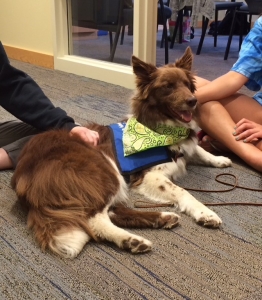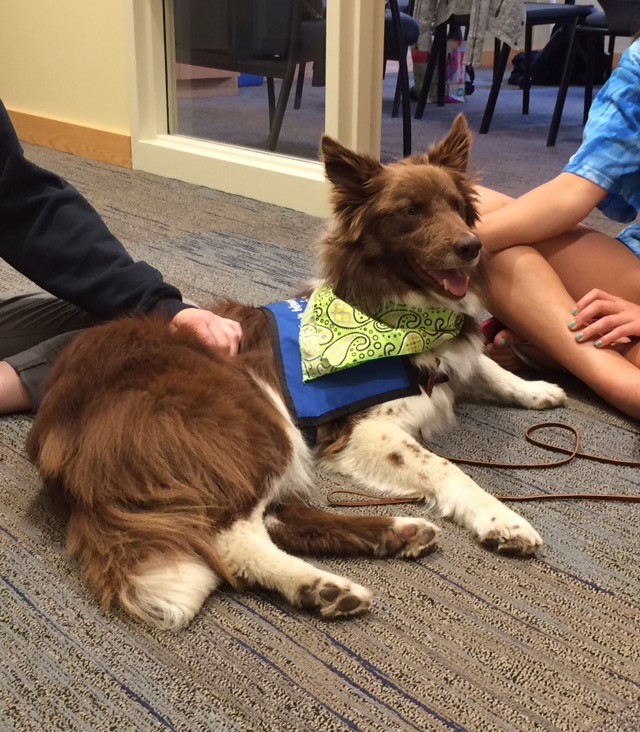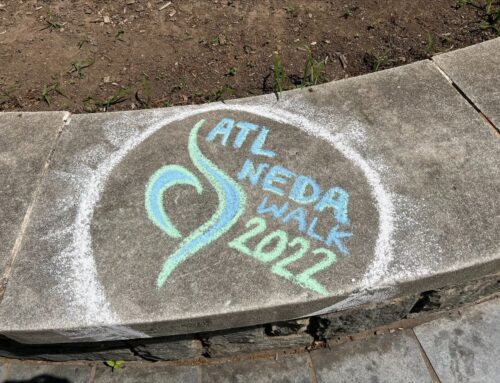 Every Wednesday at 12:00 noon, Walden’s Amherst clinic awaits the arrival of our four-legged friend: Percy Jackson. As the 5-year old Border Collie owned by volunteer Cathy Beck of Bright Spot Therapy Dogs enters the building, clients (and staff, alike!) immediately relax, smile, and soften at the sight of Percy’s friendly, enthusiastic, tail-wagging, happy demeanor. During the half-hour break between group work and lunch, everyone has the opportunity to participate in an increasingly well known, popular, and effective activity—known as animal-assisted-therapy.
Every Wednesday at 12:00 noon, Walden’s Amherst clinic awaits the arrival of our four-legged friend: Percy Jackson. As the 5-year old Border Collie owned by volunteer Cathy Beck of Bright Spot Therapy Dogs enters the building, clients (and staff, alike!) immediately relax, smile, and soften at the sight of Percy’s friendly, enthusiastic, tail-wagging, happy demeanor. During the half-hour break between group work and lunch, everyone has the opportunity to participate in an increasingly well known, popular, and effective activity—known as animal-assisted-therapy.
Within moments, Percy makes his way down the hallway and becomes encircled by people ready to visit. As everyone gathers around, he greets each person one-by-one and melts onto the floor for petting. The mood and body language of everyone immediately changes: tears are replaced by laughter, anxieties calm, shy and reserved clients open up, and those struggling with dissociation become more present. People engage in light-hearted social talk, stroke Percy’s soft coat, and take a half-hour break from internal worry and struggle.
About animal-assisted-therapy
During the past 10+ years, the integration of therapy dogs across healthcare settings has become increasingly common as patients, clinicians, and research recognize the value in even brief animal-human-interactions. Noteworthy benefits include reduced blood pressure, stress hormones, pain, anxiety, depression and feelings of isolation, while improving cardiovascular health, positive endorphin release and triggering the body’s relaxation response. Finally, animals can be a source of profound comfort and motivation.
So, what’s the relationship between dogs, DBT, and recovery?
Walden’s fundamental treatment philosophy for treating clients is Dialectical Behavior Therapy (DBT), a model developed by Marsha Linehan that combines Cognitive Behavioral Therapy, mindfulness, and skills training. During treatment, clients learn the importance of distress tolerance, emotion regulation and mindfulness, as important tools for successful recovery. And this is where an overlap between dogs, DBT, and recovery exists: being with an animal offers people the opportunity to practice and experience all of the above.
Dogs are a positive distraction, and can be deeply soothing. They help regulate difficult moods and build positive emotional experiences. Animals reduce loneliness and can increase interpersonal connection—and significantly, the human-animal relationship is a place of safety and non-judgment. Last but not least, dogs help people get out of their head and back to the present moment.
The clients voice . . .
Although animal lovers, clinical research, and healthcare providers applaud therapy dogs, I think the benefits are best expressed by clients themselves:
“Percy’s comforting nature and playful presence is a perfect mid-week reprieve from the emotional rigor of treatment. My mood is always positively affected by petting, cuddling, and laying on the ground with Percy.”
“I love when Percy comes to visit! If you are having a bad day, he surely makes it better. He is a real-life grounding tool. He teaches many, including Walden staff and patients, to come back to the present moment. He shows us that it only takes small moments to be happy and smile. He brings light to a place that can seem so dark at times.”
“I love when Percy comes. He provides a great distraction from the stress of the day . . .
[and] loves us no matter what we look like.”
“Percy helps me to not focus on the intense groups I had earlier in the day. He brings smiles and joy to everyone. It also allows patients to connect with one another on another level.”
“Animals have a way of bringing me an indescribable joy. I always look extra forward to Wednesdays with Percy. He makes me smile when I don’t feel like it’s possible.”
Recovery from an eating disorder . . .
Recovery is a process, and we remind clients to take things one day at a time. Being present, building positive experiences, and practicing moment-to-moment awareness—this is what animals teach and give us. Life is not in the past or the future, in our fears, thoughts, or worries, but very much in the here-and-now. It is in this space that recovery happens.
From the clients at Walden’s Amherst clinic, “Thank you for being you, Percy.”
About the author:
Heidi is a mental health counselor at Walden Behavioral Care’s Amherst Clinic, and has been working with adults and adolescents at the PHP level of care since 2012. She received her BA in a self-designed interdisciplinary major that focused on health through a biopsychosocial lens, and has a background and specialized training in therapy/service animals. Heidi is passionate about integrating therapy dogs into clinical work, and looks forward to expanding current offerings at Walden’s Amherst clinic.








Percy sure brought a smile to my face. Thanks for sharing.